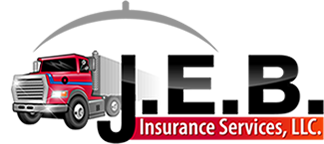The Federal Motor Carrier Safety Administration (FMCSA) says more than 400,000 truck and bus accidents are reported annually in the US. Even back in 2020, a pandemic year with little traffic, professional drivers were involved in 414,000 reported accidents. Sadly, more than 4,000 of them were fatal.
While no one likes to imagine a tragedy, we must ask “what if” questions sometimes and prepare for ugly realities. That’s why trucker insurance exists — to protect you financially after an accident. Today, the JEB Insurance team is here to guide you through the aftermath and explain what you should expect from your big rig insurance company after an accident.
Imagine an Accident in Your Truck
Imagine it. You’re loaded, traveling 55 mph down a two-lane country road when a commuter runs a red light and pulls out in front of you. (It probably happens all the time, right?)
You “T-bone” the commuter car.
You already know human safety is the priority. Immediately after an accident, you will:
- Pull off the road if it’s safe to do so
- Turn on your hazards
- Call 911
- Check yourself for injuries
- Help the other driver if it’s safe to do so
- Set up your emergency warning devices (orange safety cones)
Of course, HazMat tanker drivers might follow a different protocol, depending on their load and location.
Let’s imagine this accident is very straightforward. No one is seriously hurt, and you haven’t damaged other structures. Lots of witnesses saw the commuter car run the red light. And that vehicle is probably totaled. What happens next?
Contact Your Rig Insurance Company
First, call the number shown on your insurance paperwork. Hopefully, you keep it handy in your glove box or console. Your rig insurance company will ask you about:
- The location and time of the accident
- A description of the accident
- A description of other vehicles and passengers
- Insurance information for the commuter car
- If law enforcement has arrived
They’ll likely advise you not to “admit fault.” In other words, don’t say anything like, “If I were going slower, this wouldn’t have happened.”
Law Enforcement (LE) Arrives at the Scene
LE will ask you many of the same questions, but they want more details. In addition to checking your most recent weight ticket, electronic log device (ELD) and any paper logs, they’ll want to know:
- How fast you were traveling
- Details about the load, like the destination
- And how the accident happened
They might ask you the same questions several times and phrase them several ways. You might have this same conversation with a handful of officers. Even though you’re shaken up, speak slowly and clearly. Stay calm. Spell your name correctly and show them your rig insurance paperwork.
What to Expect from Your Rig Insurance Company Next
Over the following days and weeks, you’ll likely hear from two or more claims adjusters. These individuals are trained to estimate losses and have access to insurance databases that help them estimate repair costs. They’ll want to see your rig, the police reports, and insurance information.
Now, it’s time to get your repairs.
You Take Your Rig to the Shop (or Several Shops) for Repair Estimates
Since this accident was straightforward with no injuries, your insurance company and the commuter’s insurer will work together to determine who pays for which damages. In some states, insurance companies pay claims based on a percentage of fault and may find that you are 10% at fault while the commuter was 90% at fault. Other state laws are less complex. It depends on where the accident occurred.
Repair estimates are usually in line with the claims adjuster’s estimates. You may need to talk to the adjuster or the shop if there is a big discrepancy. Since you were not at fault, you won’t need to pay a deductible.
“Will My Rig Insurance Costs Go Up After an Accident?”
That is the golden question! If you’re a safe driver — with no tickets, DUIs, and so on — your rig insurance provider will probably not increase your rates. However, if you’ve had several accidents in recent years, they may choose to non-renew your policy when it ends or increase your rates.
Shopping Around for Rig Insurance
After an accident, many truckers choose to shop around for new rig insurance, even if they don’t experience a rate hike. Sometimes, truckers are just unhappy with customer services or claims adjusters.
When you need quotes for rig insurance, contact us. The J.E.B. Insurance team understands your needs, and we’ll work hard to get you the best rates in the business. We provide Rig insurance in Florida, Georgia, North Carolina, Texas, South Carolina, Tennessee, Iowas, Nebraska & Illinois.


